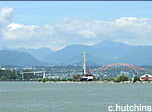2021 marks the 100th anniversary of the Remembrance Poppy in
Canada
Madame Anna Guérin, later christened "The Poppy Lady
from France", inspired by John McCrae's poem "In Flanders
Fields", had the idea to adopt the distribution of the Poppy on Armistice
Day, as a way to raise money for Veterans, and to remember those who had given
their lives during War.
In July of 1921 the Great War Veterans Association (in 1925 would unify with other Veteran groups to form the Canadian Legion) adopted the Poppy as the flower of Remembrance. Since then, the Legion has upheld this tradition of Remembrance.
Each November, Poppies bloom on the lapels and collars of millions of Canadians. The significance of the Poppy can be traced back to the Napoleonic Wars in the 19th century, over 110 years before being adopted in Canada. Records indicate how thick Poppies grew over the graves of soldiers in the area of Flanders, France. Fields that had been barren before battle, blossomed with the blood-red flowers after the fighting ended. During the tremendous bombardments of the war, the chalk soils became rich in lime from rubble, allowing the “popaver rhoeas” to thrive.
The person who first introduced the Poppy to Canada and the Commonwealth, was Lieutenant-Colonel John McCrae of Guelph, Ontario, a Canadian Medical Officer during the First World War. John McCrae penned the Poem “In Flanders Fields” on a scrap of paper in May 1915, on the day following the death of a fellow soldier. Little did he know that those lines would become enshrined in the hearts of all who would wear the flower. McCrae’s poem was published in Punch Magazine in December of that same year, and eventually became world famous.
Today, the Poppy is worn during the Remembrance period to honour Canada's Fallen. The Legion also encourages the wearing of a Poppy for the funeral of a Veteran and for any commemorative event honouring Fallen Veterans. It is appropriate to wear a Poppy during other times to commemorate Fallen Veterans, as long as it’s worn appropriately.
Thanks to the millions of Canadians who wear the Legion’s lapel Poppy each November, the little red flower has never died, and the memories of those who fell in battle remain strong.
McCrea’s poem about the Poppy, is much more than sentimental lines for school children to memorize. Colonel John McCrae’s message is a moral and political challenge to successive generations. McCrae wrote passionately from his experience midst of the horror of the battlefield. There had to be meaning to the sacrifice, and he pleads for successive generations to not “break faith with us who die”. He knew the heart of humankind, and that freedom has a “foe” that must be challenged, as there is an enduring quarrel with evil.
Perhaps he recalled the 1886 New York Stature of Liberty and the torch of enlightenment held high. For certainly the motives for war aggression are opposite to an enlighten free world. The torch is meant to light the way to freedom and guide us toward the path of liberty and justice - liberty enlightening the world. McCrae’s sermon is clear …
To you from failing hands we throw
The torch; be yours to hold it high.
If ye break faith with us who die
We shall not sleep, though poppies grow
In Flanders fields.
* * *
In Flanders Fields
BY JOHN MCCRAE 1915
In Flanders fields the poppies blow
Between the crosses, row on row,
That mark our place; and in the sky
The larks, still bravely singing, fly
Scarce heard amid the guns below.
We are the Dead. Short days ago
We lived, felt dawn, saw sunset glow,
Loved and were loved, and now we lie,
In Flanders fields.
Take up our quarrel with the foe:
To you from failing hands we throw
The torch; be yours to hold it high.
If ye break faith with us who die
We shall not sleep, though poppies grow
In Flanders fields.

















1 comment:
The political lefties take every opportunity to display themselves at ceremonies, but when the chips are down, they make themselves peripheral to the main response to evil.
Post a Comment